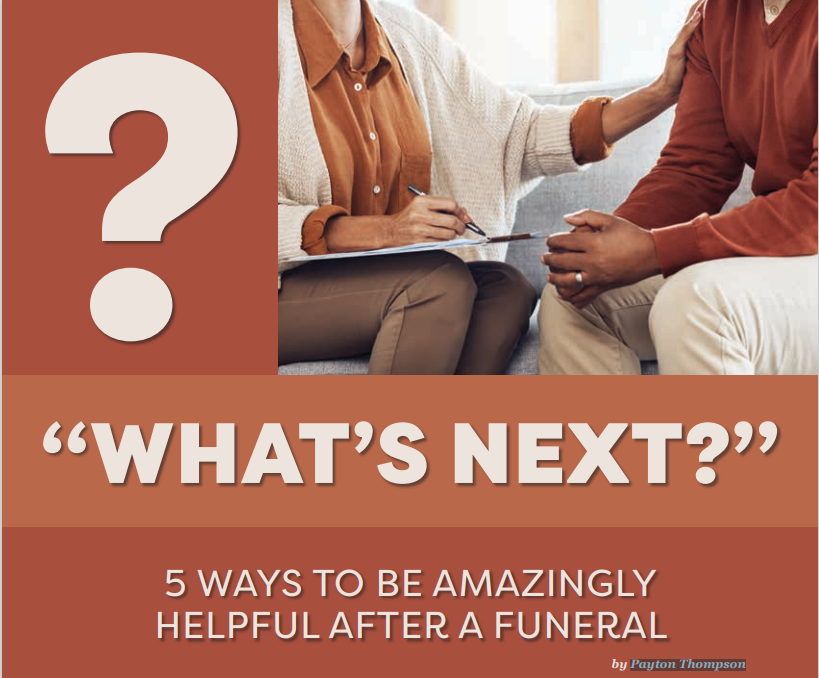(404) 312-6640
“WHAT’S NEXT?” 5 WAYS TO BE AMAZINGLY HELPFUL AFTER A FUNERAL
Even if you don’t hear it out loud, “What’s next?” is the question almost every family asks after a funeral. They’ve spent so much time focused on honoring the life of their loved one, but they’re lost on what exactly happens afterward.
Unfortunately, there haven’t always been a lot of answers. Traditional aftercare models were built primarily around sending a thank you card to families, while most of today’s models are focused on one end goal: online reviews. Sending notes and asking for reviews are great things to do, but it does raise the question as to what families need most after a funeral. And what families actually need most is help. Research shows that after a funeral, families have two universal needs: resolving their loved one’s estate matters and navigating the fog of grief. These families end up being underserved by aftercare models that lack consistency or take a one-size-fits all approach that is neither extensive enough nor detailed enough to meet their full range of unique needs. Funeral homes are experts at building trust with families and delivering remarkable and memorable experiences. I’d like to share five ways to extend your level of service by creating an amazingly helpful aftercare experience. Not only will families be more than happy to talk about your funeral home both online and in person, but you’ll receive more return business and create lifelong advocates for your brand.
HELP WITH THEIR ESTATE There is no one-size-fits-all approach when it comes to estate management. We often talk about the 125 tasks that need to be completed before a funeral, but there are hundreds of details to take care of after a funeral as well. The size and complexity of estates can vary significantly, and everyone has different needs. Every family also has a different preference on how much help they want – from DIY to full-service estate assistance. And even with the DIY approach, there are all kinds of pitfalls and mistakes people can easily avoid with some guidance. For instance, research shows that 82% of people never receive their full benefits such as life insurance or veterans benefits, and over 2.5 million estates are victimized by identity theft each year.
SO WHAT CAN YOU DO? Continue the outstanding care you’re known for by providing customized estate help that considers each family’s specific circumstances. This includes helping families prioritize the tasks that are most urgent like notifying credit bureaus or walking them through how to memorialize social media accounts. And for families who have questions or would rather have someone take care of their estate tasks for them, it’s important to develop creative options so they can receive the guidance they’re looking for. When you can provide the answers and point families in the right direction, you go above and beyond and become a memorable source of guidance.
HELP WITH THEIR GRIEF Many families have great support systems right after a loss and during a funeral. But a week or a month later, that support can – and often does – fall away. This is complicated by the fact that there is no single roadmap that works for every family or even every family member you serve. It’s also true that up to 20% of families are affected by complicated grief – painful emotions of loss that don’t improve with time – which requires even more support and care. The last thing you want to do is leave your families on their own once they walk out the doors of your funeral home. You’ve guided them this far through the grieving process, and it only makes sense to continue to care for them. It’s for this reason that a lot of funeral homes provide grief resources. But here’s the problem: many grief resources do not provide the full range of support families need. Some families handle grief on their own, others seek education and resources, while still others need individualized help from a professional. Another way to think of this is in terms of expectations. Families don’t often know what to expect after a funeral or where to go for answers. But funeral homes, being deathcare experts, are in the best position to help. When you can provide a platform that meets the full range of families’ grief needs so they have helpful educational resources and options, you exceed expectations and continue building on the relationship you’ve already developed.
DON’T JUST FISH FOR REVIEWS Did you know that as many as 85% of consumers report placing as much trust in online reviews as they do in personal recommendations? It has also been found that 91% of consumers say positive reviews make them more likely to do business with you. In today’s increasingly online world, the importance of online reviews is hard to overstate. They’re essential for local businesses, and the data supports the benefits of proactively reaching out for reviews. Indeed, 77% of families say they would leave a review if requested by a business. The danger, however, is when this gets treated like a transaction. While a review request for most businesses is transactional – a service is provided and a review is requested – the funeral profession is much more delicate and sensitive. Requesting a review days or even weeks after a funeral is too soon for some families. You risk coming across as insensitive, no matter how nicely you frame a message.
SO, WHEN’S THE BEST TIME TO ASK? After you’ve gone above and beyond through aftercare. When you offer and, more importantly, follow through with estate and grief help that actually helps, you create value. Whether that’s a program that helps families cope with their grief, information on estate closure, or just a caring, honest message of empathy, you’re doing something unexpected that families will deeply appreciate. Families look to funeral homes to guide them through a life-changing event. By providing expert help they can trust, your funeral home can continue being at the center of their journey through loss.
BE CONSISTENT How often do you stay in touch with families after a funeral? Unfortunately, the answer is different for every funeral home and every family. A lot of families will receive a check-in text message or a sympathy card, which is great. But the challenge comes when you don’t have a framework for reaching families and providing value after those initial touchpoints. While it’s not always easy to find a perfect medium for every family, there should be a measure of consistency so that you’re not just reaching out randomly and then dropping off contact altogether.
SO MUCH OF IT COMES DOWN TO PURPOSE. When you’re driven to help families through your aftercare model, you’re more inclined to organize the experience around every family’s journey through loss. You put the needs of families first. And because families will be settling their estates for weeks or months after a funeral, not to mention the unpredictable ups and downs as they journey through grief, it’s important to create enough content and communication to truly be helpful. A good place to start is by providing multichannel touchpoints (e.g., web platform, email, text messages) while also giving families all the information they need. Help them know which estate tasks need to be dealt with first, how to begin navigating grief, and where to go for additional support or help if needed. You’d be surprised by how quickly this will unify your messaging and make every touchpoint with families more meaningful.
BE SINCERE We’ve all heard it before:
- “Let me know how I can help.”
- “I’m just checking in.”
- “I’m sorry for your loss.”
- “My deepest sympathies for what you’re going through.”
- “Please don’t hesitate to reach out.”
Receiving these messages can be a source of comfort, and it’s nice to know people are there to help if you need them. The trouble is that these messages also shift the burden onto the bereaved to ask for help. Again, it’s very well intentioned, but people often struggle to reach out for help if you need them. The trouble is that these messages also shift the burden onto the bereaved to ask for help. Again, it’s very well-intentioned, but people often struggle to reach out for help even when they really need it. Partly this is because asking for help is often thought of as a weakness. It’s a vulnerable moment, and it feels uncomfortable, which gets magnified even more when you’re grieving. A more helpful approach is to find out what people need and give it to them. The difference between adequate and amazing aftercare is that you’ve already thought through how you can help, and you’ve created a clear framework for providing that help that consistently exceeds expectations.
CONCLUSION
Families have already seen the level of care and attention your funeral home is capable of. So when they inevitably ask, “What’s my next step?”, they’re hoping for answers. After all, you’ve proven that you know what it’s like to be in the shoes of someone who’s lost a loved one. Families are assuming you’ll be the expert who can help them navigate the challenges they face after a funeral as well. Meeting this moment with an amazingly helpful experience will truly set you apart. Your funeral home will gain a distinct advantage because you win the appreciation of families and continue building your relationship with them. Not only will you receive more high-quality reviews, but more families will be dedicated to elevating your brand as some of your funeral home’s biggest advocates.
Payton Thompson is co-creator and general manager of Everything After, winner of the 2022 NFDA Innovation Award. Through his leadership, thoughtfulness, and compassion, Payton and his team work with hundreds of funeral homes across the country and empower them to help families through life’s most difficult moments after a funeral. He is dedicated to creating amazingly helpful and consistent experiences that meet the full range of families’ estate and grief needs. In addition to innovating on behalf of funeral homes, Payton treasures time spent with his wife and children, and he enjoys journaling, reading, sports, and traveling.






Comments